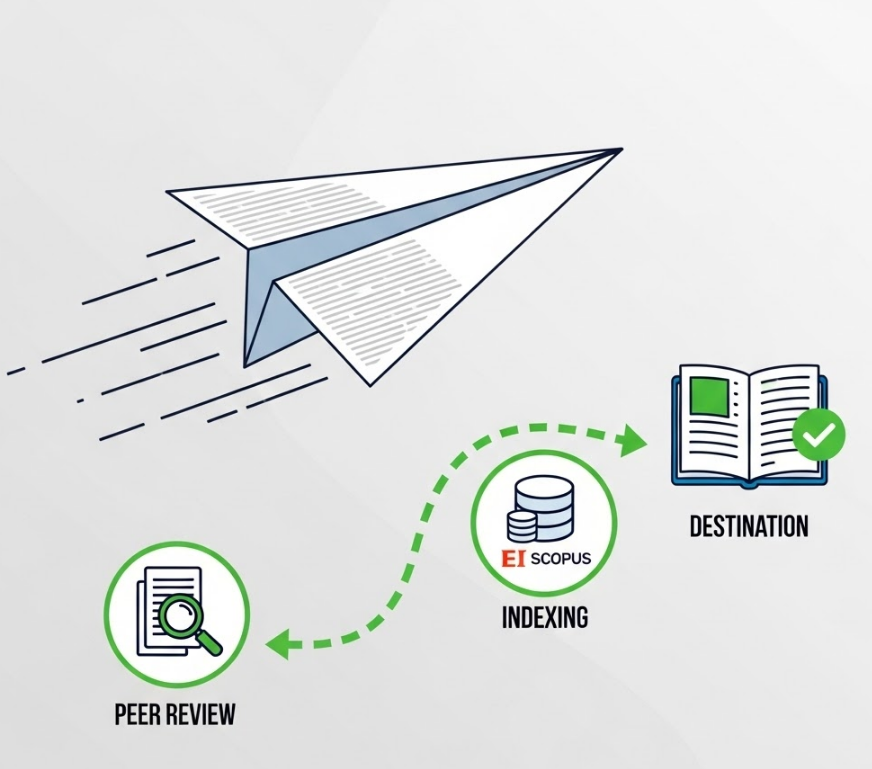For Master's and PhD students, the pressure
to publish is immense. Graduation requirements, grant deadlines, and career
opportunities often depend on having a timely publication in a reputable,
indexed journal. However, the traditional academic publishing timeline, with
its months-long (or even year-long) review cycles, can be a major source of
stress.

If you're looking for a journal that
combines credibility with efficiency, you're in the right place. We’ve compiled
a list of reputable journals indexed in major databases like EI Compendex
and Scopus that are known for their relatively short review periods.
A Crucial Disclaimer: "Fast" in academic publishing is relative. A truly
rigorous peer review process still takes time. A journal promising publication
in a few days is a major red flag for being predatory. The journals listed here
are recognized for their efficient processes, typically providing a first
decision within one to three months, which is significantly faster than the
traditional average.
1. IEEE Access
- Publisher: IEEE
- Fields: Multidisciplinary (all
areas of electrical engineering, computer science, and related
disciplines).
- Indexing: EI Compendex, Scopus,
SCIE (Web of Science)
- Review Speed: IEEE Access is famous
for its rapid, rigorous review process. It aims for a
submission-to-publication time of 4 to 6 weeks. It is a
well-respected, high-volume mega-journal.
2. Materials Today Communications
- Publisher: Elsevier
- Fields: Materials Science (covering
the preparation, characterization, and application of materials).
- Indexing: EI Compendex, Scopus,
SCIE
- Review Speed: This journal is known
for its efficient handling, with an average time to first decision often
cited as being around 4 weeks, and final publication within 2-3
months of submission.
3. Heliyon
- Publisher: Cell Press (an imprint
of Elsevier)
- Fields: Multidisciplinary (covers
all research areas across life, physical, and social sciences).
- Indexing: Scopus, SCIE
- Review Speed: As a large,
multidisciplinary journal, Heliyon's process is streamlined for speed.
Authors often report a first decision within 5-8 weeks.
4. Journal of Engineering Research
- Publisher: Springer
- Fields: Engineering (broad scope
including mechanical, civil, electrical, and industrial engineering).
- Indexing: EI Compendex, Scopus,
SCIE
- Review Speed: This journal offers a
timely review process, with authors typically receiving a first decision
within approximately 8-10 weeks.
5. PLOS ONE
- Publisher: Public Library of
Science (PLOS)
- Fields: Multidisciplinary (all
areas of science and medicine).
- Indexing: Scopus, SCIE
- Review Speed: PLOS ONE is a pioneer
of the mega-journal model that focuses on technical soundness rather than
perceived impact. This makes the review process more efficient, with an
average time to first decision of around 6-10 weeks.
How to Spot a Good Fast-Track
Journal (and Avoid Predatory Ones)
When searching for journals with short
review cycles, you must be vigilant to avoid predatory publishers.
- Verify the Indexing Yourself: Do
not trust the journal's website. Go to the official Scopus Sources list
or the EI Compendex source list to confirm the journal is currently
indexed.
- Check the Editorial Board: Are the
editors respected academics from well-known universities? Do they list
their editorial role on their university web pages?
- Look for a Clear Peer Review Policy: A legitimate journal will have a detailed and transparent
description of its peer-review process.
- Assess the Quality of Past Publications: Read a few recently published articles. Do they meet the
standards of your field?
Conclusion
For graduate students and researchers on a
tight timeline, finding a journal that balances speed with credibility is
essential. The journals listed above offer a great starting point, providing an
efficient path to a reputable, indexed publication. By doing your due diligence
and submitting a high-quality, well-prepared manuscript, you can navigate the
publication process successfully and meet your academic goals.


